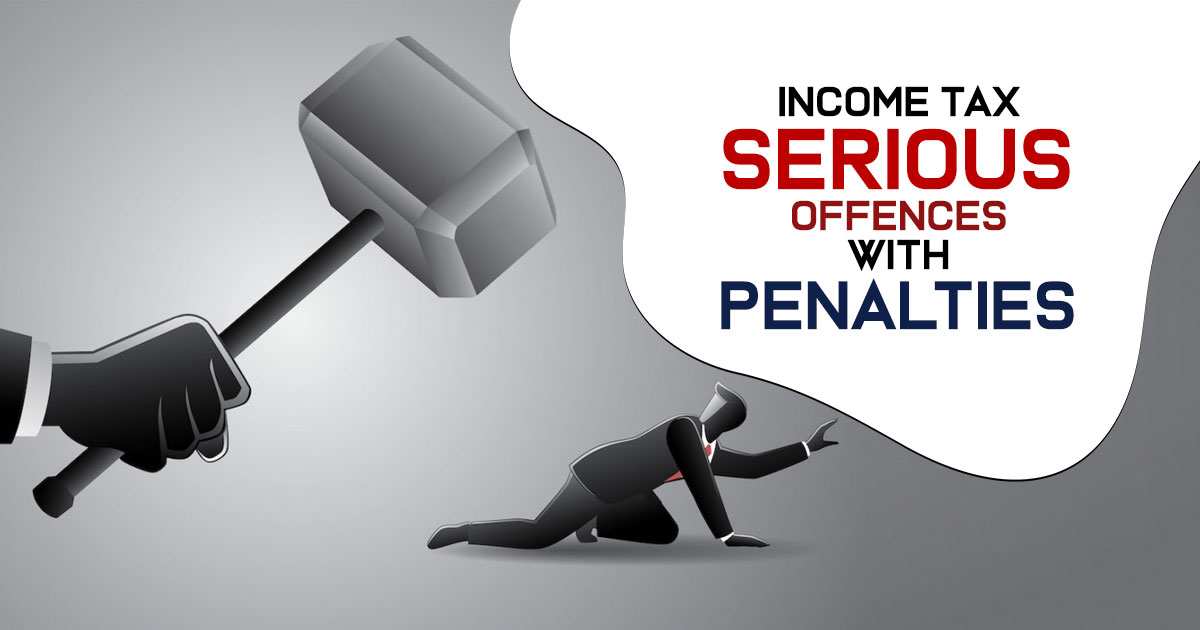
The taxpayer who has disputed within the provision of the Income Tax Act 1961 shall be subjected to pay the penalty. The penalty will be imposed on the levied amount and is distinct from the tax that is needed to pay. The fines and penalty shall be imposed on the taxpayer who performs unwanted deeds and shall be imposed under the law that is liable to apply during the time of the execution of bogus activities.
Below are the mentioned serious offences under Income tax with penalties under different sections:
Offence Under Income Tax Section 158BFA with Penalty
Offence: For the blocked time the computation of the income that is not disclosed, while below section 132 any search is executed or in context to any books of account/any other credentials or the kind of asset can be seized beneath section 132A, towards the case of any individual.
Penalty: For the case of 100% of the tax shall be the minimum penalty that is to be levied concerning the undisclosed income that is to be increased to the highest of 300% of the tax that is subjected to imposed towards the undisclosed income.
Offence with Penalty Under Income Tax Section 221(1)
Offence: If the taxpayer builds with any default in executing tax payment.
Penalty: The assessing officer shall point out the amount of the penalty. However, the amount of the penalty does not exceed the arrears of the payment.
Offence Under Income Tax Section 234E with Penalty
Offence: An assessee failed to file the return regarding TDS/TCS within the time specified under Section 200(3) and 206C (3).
Penalty: The penalty beneath this section shall be Rs 200 towards every day of default.
Offence with Penalty Under Income Tax Section 234F
Offence: The taxpayer has made a default in furnishing the return that comes beneath section 139(1) in the said limit.
Penalty: If the taxpayer furnished the return before the date 31st Dec towards the related assessment year then Rs 5000 shall be the penalty imposed on him. But if the income of the taxpayer is below Rs 5 lakh then he needs to file the penalty of an amount less than Rs 1000.
Offence and Penalty Under Section 270A
Offence: Under the act, there can be 2 cases i.e. if the taxpayer has built an under-report of his income and the other if the taxpayer has addressed an under-report for misreporting of income.
Penalty: Towards the 1st case the penalty will be 50% of the amount of the subject tax that is based on the under-reported income. In the other case, 200% shall be the penalty of the amount of the subjected tax that is on the grounds of under-reported income.
Offence Under Section 271(1)(b) with Applicable Penalty
Offence: When the return does not get furnished by the taxpayer to provide an answer on the notice then he will get punished beneath the same section. But this section is subjected to the AY 2016-17.
Penalty: The penalty that comes beneath this section is Rs 10000 for every mistime.
Read Also: Easy Guide to TDS Provisions Under Income Tax Act 1961
Offence Under Income Tax Section 271(1)(c) with Penalty
Offence: Hide the income or advantages or he files the improper particulars of his income or advantages. But this section is subjected to the assessment year 2016-2017.
Penalty: The minimum penalty beneath this section is 100% of these taxes and is avoided and the highest of it can be 300% upon these taxes i.e. avoided.
Offence Under Income Tax Section 271(1)(4) with Applicable Penalty
Offence: Income is given through the firm that is enrolled but it is not as per the title of the partnership and due to that the partner returns their income that is less than the real amount. But the same section is liable up to the assessment year 2016-2017.
Penalty: Beneath the section, the penalty is highest of 150% of the tax that is evaded.
Income Tax Section 271A
Offence: Failure to keep, maintain, or retain books of account, and documents as per section 44AA.
Penalty: This shall influence the penalty of Rs 25,000.
Income Tax Section 271AA (2)
Offence: Failure to furnish information and documents as per Section 92D(4).
Penalty: It points towards the penalty of Rs 5,00, 000.










A bit of elaboration on the topic would be appreciated since a lawyer must always harmonize with reasoning. Thank you!